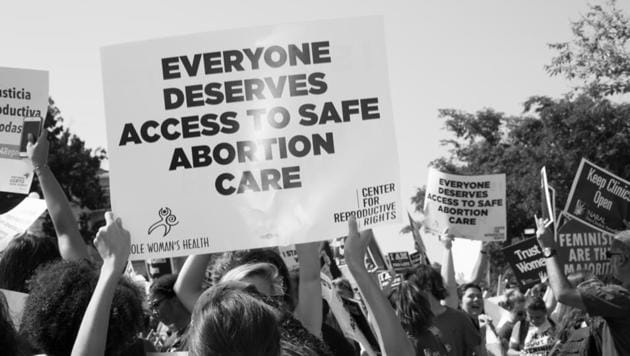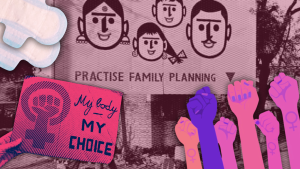Why India’s Abortion Law Needs To Be Rid Of Moralism

Last week, the Supreme Court passed an interim order allowing an unmarried woman to abort a 24-week pregnancy. The court ordered the constitution of a Medical Board, as required under the law for pregnancies past 20 weeks, to determine if this abortion could put the petitioner’s health at risk.
This order was passed after the Delhi High Court on July 15, 2022 refused relief to the petitioner on the grounds that the Medical Termination of Pregnancy Act, 1971 does not allow an unmarried woman to abort a pregnancy past 20 weeks if it comes from a consensual relationship. She can however terminate a pregnancy that is less than 20-weeks old, as per Section 3(2)(a) of the act.
Past the 20-week bar, a pregnancy can be terminated only under exceptional circumstances and that too only till 24 weeks, under Section 3(2)(b) of the Act. The appended Medical Termination of Pregnancy Rules, 2003 under Rule 3B provides a list of these circumstances and these exclude unmarried women but include the following – women whose marital status has changed – widowed/divorced, survivors of rape or other kinds of sexual assault, minors, the mentally ill, and in case of foetal malformation.
However, as seen in recent orders (here and here), the courts have the extraordinary power to override the 24 week limit.
The petitioner who took her case to the apex court had learned about her pregnancy in the 22nd week. She decided to terminate it because of personal and financial reasons and approached the Delhi HC for permission as required under the law. Her petition also sought the inclusion of unmarried women in the list provided under Rule 3B. However, Delhi HC court reasoned that her appeal was not covered under the existing abortion law.
Question of bodily autonomy
“The order was extremely disturbing for her and added to her mental agony. She repeatedly kept saying that she was not at fault as her trust had been broken by her former partner,” said Amit Mishra, her counsel in the matter. The HC decision would push her into a life marred by stigma, he said, adding that her financial situation and educational qualifications did not allow her to care for a child. “She was disappointed by the inability of the law and justice system to support her and by the taking away of her right to bodily autonomy,” Mishra added.
The lawyer also pointed out that the court assumed the foetus had its own rights and prioritised these over the petitioner’s. “According to medical science, the potential viability of a foetus surviving on its own comes after 24 weeks. Thus a foetus does not have any independent rights of its own and it becomes a child only upon live birth,” he said.
The Delhi HC had interpreted the abortion law too literally, overlooking its actual intent, Mishra pointed out, especially since the amendments made in 2021 had replaced the word ‘husband’ with ‘partner’.
‘Narrow view’
The three-judge bench of the Supreme Court also observed that the Delhi HC had taken a very narrow view of the related provisions: “It appears that the High Court has taken an unduly restrictive view of the provisions of clause (c) of Rule 3B. Clause (c) speaks of a change of marital status during an ongoing pregnancy and is followed in parenthesis by the words ‘widowhood and divorce’. The expression ‘change of marital status’ should be given a purposive rather than a restrictive interpretation. The expressions ‘widowhood and divorce’ need not be construed to be exhaustive of the category which precedes it.”
The court highlighted that through the 2021 Amendment the Parliament had intended to expand the scope of the law and include unmarried and single women. And that the Parliament evidently did not aim to limit the benefits of the MTP Act only to married women. The apex court stated that the law recognises the reproductive choices of a woman and her rights to bodily integrity and autonomy under Article 21 of the Constitution.
In the light of these observations, the apex court set aside the order of the Delhi HC and allowed the petitioner to go forward with the termination of pregnancy in the 24th week. “The petitioner is relieved after the order of the Supreme Court. It has been an important and difficult fight for her. This order sets an example for any future cases that may arise where unmarried pregnant women seek to enforce their rights and reproductive choices,” said Mishra.
Gap between law and interpretation
This order comes at a time when abortion laws across the world are under sharp scrutiny in the wake of the US Supreme Court’s verdict on Roe v Wade that has taken away the constitutional rights of American women to seek abortion. It is time to revisit India’s abortion law too, say gender and reproductive health experts.
The recent order of the Indian Supreme Court fills a critical gap between the abortion law and its interpretation, said Nikhil Datar, a Mumbai-based gynaecologist and professor of health laws. Datar has helped many women seek late abortions within the framework of the legislative procedure.
He believes that India’s abortion law is discriminatory because it distinguishes between married and unmarried women. “This order is a necessary one. But the law still requires to be amended to expressly include unmarried women among the list of those who hold abortion rights past 20 weeks under exceptional circumstances. And this would inform the entire medical fraternity and not just those who are aware of the SC order,” he said.
The gynaecologist has also filed a petition before the SC calling for a reanalysis of the MTP Act and its appended rules. “The time limits set for medical termination of pregnancy are arbitrary limits and not founded on any sound medical reasoning. If termination can be done till 24 weeks in some cases, it must be assumed that it is safe. Then why is it allowed only in exceptional cases or to certain categories of women?” he said.
Time bar
Datar maintained that there are no medical grounds for the weeks-based bar on abortion and this comes from a moralistic view of women’s reproductive rights. “Pregnancy can be terminated even in later stages. It is only that post-24 weeks a foetus can potentially survive on its own. As the gestational period advances, the termination requires advancement in the procedure [abortion through pills is no longer possible] but it does not in any manner become more risky or dangerous to the life of the woman. Be it 24 or 28 weeks, the procedure for medical termination remains the same.”
As we said earlier, the courts can override the 24 week limit under certain circumstances and to bolster his argument, Datar pointed to recent Delhi HC and Kerala HC orders. These allowed minor survivors of sexual assault to terminate their pregnancies in the 25th and the 30th week respectively. “A general conclusion that post 24 weeks a termination becomes risky for the woman is incorrect. The potential health or life risks need to be determined on a case-to-case basis, at any time during the pregnancy,” he said.
A World Health Organization report has stated that such gestational age limits have led to an increase in unsafe abortions, maternal mortality, and poor health outcomes. This is because the gestational bar delays access to abortion, resulting in the continuation of pregnancy, especially among women with underlying health disorders, co-morbidities or cognitive impairment.
Reiterating advocate Mishra’s point, Datar said that the only “turning point” in a pregnancy is a live birth after which the rights of the child accrue. Until then, a foetus is l an appendage to the woman’s body. This view is also backed by the WHO report.
Discriminatory and arbitrary rules
Datar also questioned the requirement for medical boards to permit post-20 weeks abortions. “The existence of these boards violates the privacy of the pregnant woman, and requires them to spend valuable time and money in travelling to the boards and seeking permission. Further, under the mandate of law, the boards shall constitute a gynaecologist, a paediatrician, and a radiologist or sonologist. Apart from the gynaecologist, none of the other medical professionals on the board possess the necessary knowledge, expertise, and experience in matters of pregnancy,” he said.
In Datar’s opinion the constitution of medical boards is an unncessary statutory requirement and acts as a barrier to accessing abortion facilities in private institutions. This is because the law permits private institutions to apply for government authorisation for terminating pregnancies till 24 weeks only, upon examination by the board.
We had reported earlier that though abortion is legal in India it is not easy to access because it is not rights-based, depends too much on the views of the medical fraternity, and is highly stigmatised.
“Abortion law in India requires an urgent reformation to enable better access to safe medical termination. For this, the arbitrary limits set under the law need to be revisited, and the setting up of an unnecessary body like the medical board needs to be reconsidered,” said Datar.
We believe everyone deserves equal access to accurate news. Support from our readers enables us to keep our journalism open and free for everyone, all over the world.




